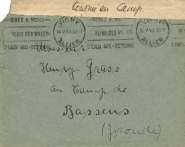This camp was established in the 18th Military Area and appears on a list of camps for civil internees dated November 19, 1940, and produced by the Service Historique de l'Armée de Terre.

Letter from Vichy dated 14.5.1940 to a German internee.
Handwritten camp censure on the sealing tape.

For lack of information relating to this camp, this page remained succincte a long time. However, in March 2008, thanks to this site, I have been contacted by Professor Alain RUIZ, of the University Michel de Montaigne Bordeaux III. He wrote the study “CARL EINSTEIN im EXILE” in which he gives a lot of details about the CAMP AT BASSENS. Thus, the veil rose on the existence and the operation of this camp. I would like to thank Professor RUIZ very much for his pleasant step.
The CAMP at BASSENS, located at approximately twelve kilometers of BORDEAUX, occupied an old powder mill built during the First World War in the port area of BASSENS, on the right bank of the Garonne and closed down since 1921.
In spring 1940, the buildings of this powder mill were arranged to receive “undesirable” foreigners. Today, nature has taken again its rights and the site is invaded by an abundant and wild vegetation.
Approximately 1100 prisoners, 750 of them being Jews. The others 350 were German soldiers captured at the beginning of the “blitzkrieg” on France.
Some important persons - journalists, writers, politicians, etc - who took refuge in France, were interned.
Henry JACOBY, Berliner publicity agent, reported as follows his stay in the CAMP at BASSENS:
"Our bedsteads were installed in an immense warehouse. Moreover, there was a building in the various parts of which beds stood. Shortly after our arrival, they were occupied by men belonging to older age groups and who had been interned meanwhile.
In the middle of the factory's ground stood up some unfinished powder towers, not very high and which were covered with trees and of bushes which had been able to develop here quietly during twenty years. This area became rapidly very interesting for me. Every morning, we had to be ranged so that men which were needed for loading works in the port at BORDEAUX can be selected. In general, the number of needed men was easily reached because much was happy to leave the camp and gain pocket money.
In theory, interior work - before all dormitories' cleaning - was to be carried out by those which were not suited to work on the port. But, practically, they were dealt with by group of homosexual - foreign Germans - who wanted to remain between them. But, as everyone was to be affected with a task, best was - when one preferred not to be sent to the port - to remain invisible. The sector of the powder tower was completely indicated for that, and it is there that I spent time between the meals with a book. I could then expose me to the sun when the weather was nice and, when the weather was bad, find a shelter.
In June 1940, the approach of the German army of BORDEAUX was the source of an increasingly large anguish for the internees at BASSENS which feared to be caught in a trap and delivered to the GESTAPO. Henry JACOBY adds:
"Finaly, we did not need news any more about the situation of the German army, because we heard the closer and closer noise of the gun hours after hours. We, the political emigrants of the camp, did not doubt that Gestapo advanced with the German army and that it would greedily catch us. One night, gun shots burst in the camp. The guard had shot on a German reconnaissance aircraft flying at low altitude."
Few days before the arrival of the Germans at BORDEAUX (June 27th, 1940), the commander of the Camp at BASSENS understanding the gravity of the situation for much of internees, acted so that the majority of them could leave the camp by small groups. Using subterfuges, the others escape too.
Regarding the archives of the camp, they were destroyed as reported by documents preserved at "Archives de l'Armée de Terre", at VINCENNES.
02/10/2009
